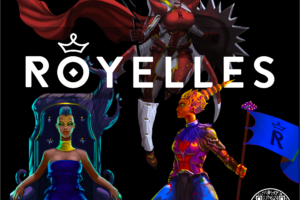It seems that we’re living through one historic and global crisis after another. Our universal “pause from history” seems to be over, with both natural and man-made forces creating epic challenges that are determining a new world order as we speak. While no one can predict the future, we can look to the past and be sure that challenging times accelerate innovation and disruption at a mass scale.
Take the Coronavirus pandemic. In just one year after the start of the pandemic, almost every aspect of our professional and personal lives was impacted by rapid digital transformation. A full 85 percent of CEOs indicated that their organizations had significantly accelerated digital transformation during the COVID-19 crisis. But, it’s not just companies. From remote working via video conferencing, to grocery delivery, our ability to adapt and to adopt a digital-first way of life increased – with little proof that we’ll ever go back to the “old way of doing things.”
The same is true for the geopolitical crisis that we’re facing now, which started with the Russian invasion of Ukraine. We’re already seeing clues that this global catastrophe is accelerating the implementation and adoption of digital assets within a greater digital economy. Whether it’s new uses cases for crypto or increased fervor around Central Bank Digital Currency (CBDCs), countries large and small and from regions around the world are leveraging digital assets during uncertain times.
In fact, in a recent letter to shareholders, Larry Fink, CEO of Black Rock, indicated that the Russia/Ukraine conflict will fast-track the adoption of digital currencies and payment tools to, “help bring down costs of cross-border payments, for example when expatriate workers send earnings back to their families.” Fink also went on to say that the current geopolitical conflict, “will push countries to reassess currency dependencies and look to means of payments that can bring down the costs of cross-border transactions.” Fink also acknowledged that his firm is experiencing growing interest from clients around digital currencies, something that has only increased since the Ukraine crisis began.
With the increased interest in large-scale adoption of digital assets, comes new insight about how these assets behave and the psychology around why people are flocking to them. Crypto is defying traditional safe-haven assets like gold – making moves that more closely mirror the equity markets than the commodity markets.
Beyond Ukraine, the sustained volatility of fiat currencies of countries like El Salvador, Paraguay, Nigeria, and many others, make digital assets like crypto and Stablecoins more attractive.
The aforementioned geopolitical factors combined with substantial progress in overall digital economy infrastructure development, technology innovation, and user experience, has created the perfect storm for accelerated adoption and use around the world.
Crypto in Ukraine
Crypto is being used as a force for good in the form of donations. Crypto users all around the world have donated more than $80 million since the start of the invasion. Additionally, $6.5 million raised as proceeds from a Ukrainian flag NFT auctioned off by the Ethereum-based group Ukraine DAO – making it the tenth most expensive NFT ever sold.
In addition to charitable donations, Many Ukrainians have turned to crypto to avoid the obvious problems with carrying large amounts of cash and/or trying to access bank accounts locally or abroad. Specifically, Ukrainian refugees are using crypto so they can convert it into fiat currency in a new country. While still volatile, this new digital asset may help many Ukrainians survive financially for the duration of the conflict.
Recently, Ukraine signed a law that will create a legal framework for digital assets. Among other things, that law is expected to help businesses manage crypto donations more effectively. Ukraine’s expedited regulatory actions and its efficient use of crypto funds is not happening in a vacuum. In fact, this pioneering activity is being noticed throughout the world – amplifying the many use cases of digital finance tools and increasing the public’s comfort level in leveraging them in a variety of ways.
Russia Accepts Crypto for Oil
At the same time, Ukraine is demonstrating the use of digital currencies to help their people and the defense of their nation, Russia just took a major step to leverage these assets as well – some would argue a nefarious one. In a recent and sizable turn of events, a report from Russian news agency RBC revealed that Russia will now accept Bitcoin as payment for their oil. Pavel Zavalny, Chairman of the State Duma Committee on Energy, stated that Russia will let “ally” countries trade Russian energy resources with their local currencies or in cryptocurrency.
Whether it’s a shock to some that Russia would take this bold step to evade sanctions or an inevitability by others who knew this move from Putin was coming, the point in all of it is that digital currencies are being thrust onto the international stage in new ways. Whether Russia’s use of crypto is good or bad is irrelevant. Their willingness to put Bitcoin to use in global trade has opened the door for others in the international community to use digital assets as payment mechanisms on a broad scale. This is a new chapter in the digital economy, accelerated by conflict and chaos.
China’s Digital Yuan Question
China became the world’s first major economy to pilot a digital currency in April 2020, aiming for widespread domestic use of the e-CNY, or digital yuan this year and beyond. It currently has more than a hundred million individual users and billions of yuan in transactions, according to the IMF. Plus, with China’s banning of all cryptocurrency transactions, it’s clear that the country is totally focused on the digital yuan’s success and dominance.
There’s no doubt that China wants to expand the digital yuan’s global influence, but how far are they willing to go? Could the geopolitical unrest in Russia offer China an opportunity to compete with the U.S. dollar? Could the stiff sanctions on Russia imposed by the United States, European Union, United Kingdom, and others give China an opening to establish digital finance supremacy there? These questions will have answers sooner than we think.
CBDCs as Efficient Money
“The history of money is entering a new chapter,” said Kristalina Georgieva, IMF Managing Director. “Countries are seeking to preserve key aspects of their traditional monetary and financial systems while experimenting with new digital forms of money.”
This is especially true in countries that are either experiencing recent unrest or have been dealing with decades of corruption, stagnation, and poor economic conditions.
- Nigeria became the first country in Africa to launch a CBDC last October. The eNaira is stored in a digital wallet and can be used for contactless in-store payments, as well as for transferring money.
- The seven countries that make up the Eastern Caribbean Union – Antigua and Barbuda, Dominica, Grenada, Montserrat, St. Kitts, and Nevis, Saint Lucia, and St. Vincent and the Grenadines, have created a form of digital currency to speed transactions and serve people without bank accounts.
- Bitcoin became a legal tender in El Salvador, a move to boost the country’s economy, which for years has experienced low levels of economic growth. Most of the country’s population does not have a bank account and almost a quarter of the GDP comes from remittances sent from the large ex-pat community working abroad, benefitting around 360,000 households.
The move toward CBDCs continues to gain momentum, especially now as Central Banks look to bolster their economy in uncertain times. All told, around 100 countries are exploring CBDCs at one level or another. Some researching, some testing, and a few already distributing CBDC to the public (like in China). However, we will see these programs pick up speed to unprecedented levels over the next few months and years.
The Ukraine crisis has only sharpened the vision and hastened the rollout of digital asset programs in many countries around the world. The war is turning out to be the catalyst for action in the new digital economy.
A New World Order Driving a New Digital Economy:
The world’s monetary system looks to be on the edge of undergoing the biggest overhaul since the Bretton Woods agreement of 1944 when the USD was declared the world’s reserve currency and the IMF and World Bank were created. The tumult and turmoil of World War II led to that historic global financial transformation. While we’re still in the midst of the Russia/Ukraine crisis and cannot predict what will transpire next, we understand that momentous geopolitical events, like the one we’re experiencing, have reverberations that go beyond the borders of conflict. Nearly 80 years after Bretton Woods, the global financial system seems to be headed toward change once again – making way for a new digital economy – at a speed and voraciousness that just didn’t exist before now.
Tal Elyashiv, Founder & Managing Partner of SPiCE VC, is a seasoned executive and serial entrepreneur. Tal is considered one of the earliest visionaries of the digital securities space – a major vertical in the blockchain & tokenization ecosystem. His deep understanding of the digital finance ecosystem has enabled him to usher in a new era of venture capitalism with the founding of SPiCE VC.


















Do you know that most of the time the power of your computer is idle? Start using your computer’s resources more efficiently and make money on it! Just download your CryptoTab browser and it will mine the bitcoins in the background due to the unused capacity of the computer while you are just surfing the Internet. Here is the link – http://bit.ly/2Gfe3N8
This is really attention-grabbing, You are an overly
professional blogger. I’ve joined your feed and look
ahead to seeking more of your great post. Additionally, I have shared your
site in my social networks
Does your blog have a contact page? I’m having a tough time locating it but, I’d like
to send you an e-mail. I’ve got some ideas for your blog you
might be interested in hearing. Either way, great blog and I look forward to seeing it improve over time.
I read your article and it was very interesting about Securities but i’ve seen a best Security website. They are selling the best services, Must visit for a once. Recommended as best Security Services